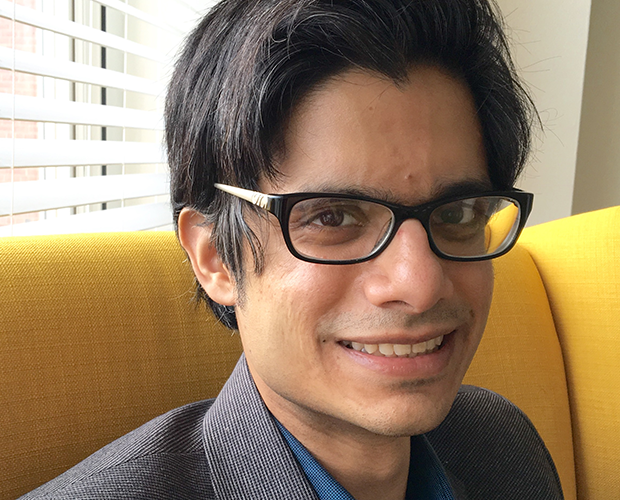Grounded in economics

Meet GPS’s new assistant professor, Gaurav Khanna, an economist who is leveraging his inherent interest in socio-political issues to ask important, policy-relevant questions
Aug. 21, 2017 | By Amy Robinson | GPS News
Gaurav Khanna fondly remembers lively family dinner-table debates on socio-political issues.
“Growing up in a developing country like India, one always wonders why some societies do better than others, and what are the best kinds of policies that help make people better off,” he explained. “Economics is just one way to answer such questions.”
As such, Khanna sought to tackle those unanswered questions and received economics degrees along the way from Delhi University, University of Oxford and University of Michigan. And, as the newest assistant professor at the UC San Diego School of Global Policy and Strategy (GPS), he is “all hands on deck” to get them answered through his work inside the classroom and beyond.
Fresh off a yearlong postdoctoral fellowship at the Center for Global Development (CGD) in Washington, D.C., we asked him what this type of fellowship means to a newly minted professor.
“At CGD I had the opportunity to interact with and present new research to the foremost migration scholars, plus elicit valuable feedback,” Khanna said.
Khanna co-wrote with Nicolas Morales a working paper at CGD titled “The IT Boom and Other Unintended Consequences of Chasing the American Dream” that is already garnering much media attention. The paper focuses on the impact of high-skill migration from India to the U.S., and is contributing to the ongoing U.S. debate about immigration policy. He and Morales offer evidence-based reporting that examines the relationship among migration, the IT sector and the economy.
This is just one of many research projects underway. As he explained, there are two other strands of his research: one that looks at education policy in India and another that centers around the economic drivers of conflict.
On the latter, he explained that he explores how governmental investment in fragile zones induce or reduce the likelihood of conflict.
“I’ve studied this in the context of rebel militias in India. Then, along with co-authors, we investigate the relationship between natural resources such as diamonds, oil and minerals and conflict in Sub Saharan Africa,” Khanna said.
Like many economists, Khanna develops and designs models to predict responses to changes in policy and market conditions when designing his research projects, and emphasized the importance of integrating powerful modelling with rigorous statistical analysis.
“Models help refine our understandings of why certain relationships exist; good statistics tell us whether they exist. Good statistics should be based on an underlying hypothesis generated by a model, and a good model should generate hypotheses that are empirically testable,” he explained.
Even though he won’t be in the classroom until later in the academic year, when he will teach immigration and immigration policy and co-teach the Public Policy capstone with Professor Zoltan Hajnal, Khanna is already brainstorming a few points he hopes to impress on students.
“The economic causes and consequences of migration and migration policy have been at the forefront of academic debates and political battles all over the world. I hope to be able to engage with students on such a topic dear to me,” Khanna said.
Khanna emphasized he is fortunate to co-teach a capstone course for the Master of Public Policy degree program, adding that he looks forward to working with students on their creative ideas, and on how policy, businesses and individuals interact in our society.
Beyond collaborating with students, Khanna noted he’s also looking forward to learning from and forging new connections with other GPS faculty members and scholars across campus.
As he puts it, Gordon Hanson is an expert on immigration and Eli Berman is a foremost scholar on conflict. Josh Graff Zivin and Craig McIntosh are some of the most creative development economists out there, and, in the UC San Diego Department of Economics, there is Karthik Muralidharan, Prashant Bharadwaj and Paul Niehaus — all top-notch development economists working on exactly the things in which Khanna is interested.
Growing up in India and having spent the last year on a postdoctoral fellowship, Khanna is just now settling into — and enjoying — the sunny Southern California lifestyle.
“I can’t think of a better place to be. I have discovered the joy of eating ice cream sandwiches while watching sunsets on the beach,” he shared. “And given my interests in immigration, I am curious to check out the border region very soon.”
3 questions with Assistant Professor Gaurav Khanna
What are the real-world impacts of your research?
My aim is to engage with policymakers on the consequences of building schools and upgrading infrastructure in developing countries, on the impacts of migration to the U.S. and the determinants of conflict in fragile areas.
What skills or understanding do you hope students leave your class with?
The ability to ask important, policy-relevant questions and then answer them in a watertight manner.
What is your academic focus?
Education policy and infrastructure in developing countries, U.S. immigration policy and conflict.

